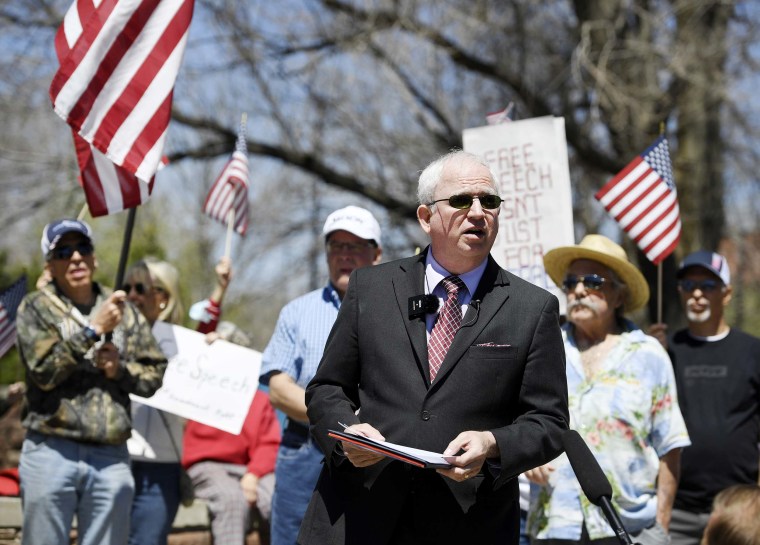On Tuesday, NBC News correspondent Ali Vitali, stationed outside Fulton County's Rice Street jail in Georgia, came face-to-face with one of America’s most infamous lawyers and asked him a question most attorneys neither expect nor hope to get: Who is paying for your lawyers?
And in response, John Eastman, a constitutional law scholar and volunteer lawyer for former President Donald Trump’s 2020 presidential campaign, responded simply that he alone is paying his fees before refusing to comment on other issues.
It’s well understood that money makes people do strange things. But in the criminal defense world, lack of money does the same.
Their exchange — while brief — is nonetheless significant because like Eastman, many other former lawyers for Trump, most of whom were never paid for their services in the first place, also now find themselves under investigation, if not indictment. And many of them appear to be without anyone to assume the cost of the lawyers they've personally had to retain.
A search of the Federal Election Commission’s database, which reflects spending through June 30 of this year, seems to confirm this. I looked to see whether any of the major Trump-affiliated/controlled campaign committees — Save America, his leadership PAC; Make America Great Again Inc., the primary Trump-affiliated super PAC; Donald J. Trump for President 2024, his official presidential campaign committee; and the Trump Save America Joint Fundraising Committee — has paid for the legal expenses of his most prominent former lawyers-turned-co-defendants and/or unindicted co-conspirators. What I found surprised me.
According to that database, while campaign committees associated with Trump have spent tens of millions of dollars on Trump’s own legal expenses, at no point has any of those four committees paid the law firms known to represent Eastman, former Trump Justice Department lawyer Jeffrey Clark, former Trump campaign lawyers Rudy Giuliani or Jenna Ellis, or Eastman’s fellow constitutional law expert and volunteer lawyer Kenneth Chesebro. At best, one of those committees paid $340,000 to a vendor Giuliani retained in connection with Georgia election workers Ruby Freeman and Shaye Moss’ ongoing civil defamation lawsuit against him.
Moreover, according to new reporting by CNBC, a new legal defense fund established by two Trump allies to assist aides and employees with their legal expenses has not raised any funds, much less distributed them.
Asked by NBC News about Trump’s payment, or lack thereof, for his ex-lawyers’ legal expenses, the Trump campaign had no comment.
But overall, Trump — whose musical favorites notoriously include the Village People’s “YMCA” and Andrew Lloyd Webber’s "The Phantom of the Opera — now seems to be singing along with the Taylor Swift catalog: “You’re on your own, kid. You always have been.”
That’s why Ellis, for instance, has opened a “crowdfunding support page” to help fund her legal defense. As of today, she’s raised more than $94,000, which is a lot of money, except when you’re under indictment.

It’s well understood that money makes people do strange things. But in the criminal defense world, lack of money does the same. And that’s why we might increasingly see former Trump lawyers do anything and everything they can to slow these proceedings down and stop the bleeding.
One key example is Clark, who, like others, has not only filed a notice to remove the Fulton County indictment to federal court, where his case could move more slowly and with a more advantageous jury pool, but has also asked for an “emergency” stay of the Fulton County case so that he does not even have to be processed or booked at the Rice Street jail. Clark claims he should not have to choose between “making rushed travel arrangements to fly into Atlanta or instead risking being labeled a fugitive.”
But could it be that Clark is less concerned about the rush and more pressed for cash? After all, he now has been indicted in one jurisdiction, is an unindicted co-conspirator with unresolved exposure in special counsel Jack Smith’s election interference case, and remains mired in disciplinary proceedings with the D.C. Bar.
And while Clark is apparently now employed at the Center for Renewing America, a conservative think tank heavy with Trump alums, it seems likely that his incoming cash flow is considerably less than when he was a partner at Kirkland & Ellis, the blue-chip law firm where former Attorney General Bill Barr and his successor Jeff Rosen were also members.
All of this is to say that fealty to Trump is and always has been expensive, as another former Trump lawyer, Michael Cohen, has long warned. And while Trump initially walked away scot-free as Cohen served time, the one-two punch of financial pressure and threat of jail for Cohen ultimately led to Trump's indictment earlier this year by another prosecutor, Manhattan District Attorney Alvin Bragg. Could Trump's apparent refusal to defray the costs of his former lawyers' legal defense hurt him even more? Watch this space.
